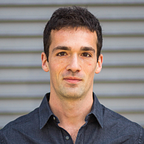Tinctorium: Creating the World’s Greenest Jeans
Denim, one of everyone’s favorite fashion pieces, has a dirty secret: Indigo. The dye that’s so critical to giving jeans their characteristic blue. However most consumers don’t know the dangerous and environmentally toxic process of dyeing the billion pairs of jeans that are sold yearly.
Tinctorium is creating a new solution using synthetic biology. For the first time ever, the denim industry can make the same jeans that consumers love without the environmental cost. We talked with co-founders Michelle Zhu and Tammy Hsu to learn how.
Denim is seen as a timeless wardrobe staple. How did you have the idea of startup to reinvent a key piece of the industry?
Tinctorium’s technology came out of the PhD work of Tammy, our CSO, who was engineering bacteria to biosynthesize indigo. When she and the team got the technology working they realized the broader implications for denim. Chemical indigo is a longstanding product with little sustainability innovation despite its ubiquity in jeans, toll on the environment, worker safety issues. Amidst all the heat the fashion industry is taking for sustainability, denim is particularly under scrutiny due to its complex supply chain.
Knowing this, we were excited by the idea of reinventing a core aspect of denim manufacturing and got quick validation when a number of denim experts were interested in using our indigo. The denim industry actually looked at bioprocesses for indigo production years ago but the time wasn’t right. The tech wasn’t ready and the market, both consumers and regulators, didn’t care. Now that sustainability is a core issue to consumers and governments the industry is again looking at this issue and ready to invest in solutions that scale.
You mentioned industry has looked at this before, tell us more about why now is different.
A big reason bio-based solutions weren’t adopted earlier is cost. These processes take time and are initially expensive to scale to industrial levels so it was easy for chemicals companies to temporarily drop prices and undercut adoption of any bio process. Today, the landscape is different due to the mindset of customers and global awareness of environmental issues. People are willing to pay more for products that are better for the environment, we’re seeing this across food, fashion, cosmetics, and more.
Our technology has also advanced beyond pure biosynthesis, the original idea. Tammy programmed the bacteria to make an indigo precursor and an enzyme which allows us to get rid of chemical reducing agents. These toxic chemicals are extremely water polluting and create cost for dye mills in waste water treatment — that is if they do that at all.
So speaking of cost, is indigo a big cost driver for denim?
Indigo is quite cheap right now, and a big reason is that it doesn’t reflect externalities like its environmental harm and health hazard during production. Overall it’s a fraction of the supply chain for making jeans, less than 1% of the cost. So there is flexibility for a small price increase to yield great benefits in sustainability. Our strategy is to bring this solution to consumers who have not known about the cost of indigo or that chemicals like cyanide and formaldehyde are key to this process. We’re creating brand awareness and making our indigo a hero product of jeans.
With this new sustainable process we are looking to set a new standard for the whole industry. The current process shouldn’t be accepted now that there is a cleaner way.
You talked to experts when this was a project at UC-Berkeley, now that you’re a company how have interactions been with big brands?
Expert discussion with denim brands helped us validate need as scientists. Now our conversations are around partnerships and how this can be a gamechanger for brands today. They’re excited to bring this into the textile industry and create new standards. So we are doing collaborative research on supply chain integration and exploring commercialization of new lines.
Overall, brands are thinking about this strategically as risk mitigation and brand equity to differentiate themselves by showing something new and better for the world. From a risk mitigation angle, indigo production currently relies on one country and one primary supplier, so providing a new production source could also preempt regulatory risk.
How long did this transition into a startup take?
This is literally a grad to entrepreneur story, beginning at IndieBio; Tammy gave her PhD exit talk in the first week of the program! Everything has moved so fast since then. We’ve pushed from a 10L scale to a 300L scale of fermentation and then ran our indigo on an industrial dye machine to prove out our technology. Being able to get that much product so fast and plug it in directly to the supply chain was a huge validation. On the business side, being embraced by brands was huge. Alongside that we had Adriano Goldschmied and David Breslauer join our advisory board. They bring an incredible amount of expertise in synthetic biology, building startups, creating denim lines, and they help open doors for us in the industry.
What does the next year or two look like?
We’ll be back to the lab working hard on rapid development and scale up. We know what we need to optimize to get perfect dye shades, increase product titers, and rapidly prototype new fabric styles and concepts to take our dye out to the fashion world. Alongside that, a critical piece is developing our own voice to tell our story, talk to consumers, and spread this message. Social media channels and our jean waitlist is a huge part of us building our own demand. We’ve gotten feedback from over 700 consumers and confirmed that people want this, they’ve just never had access before.
Watch Tinctorium’s pitch on IndieBio Demo Day, Tuesday June 25th in San Francisco or via LiveStream. Register here!
